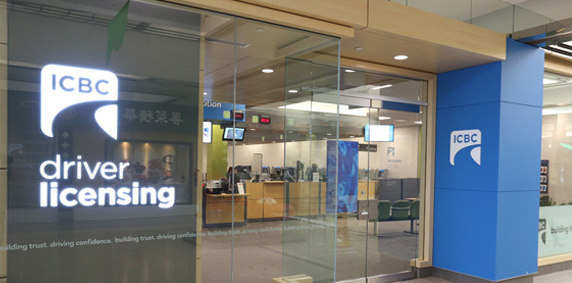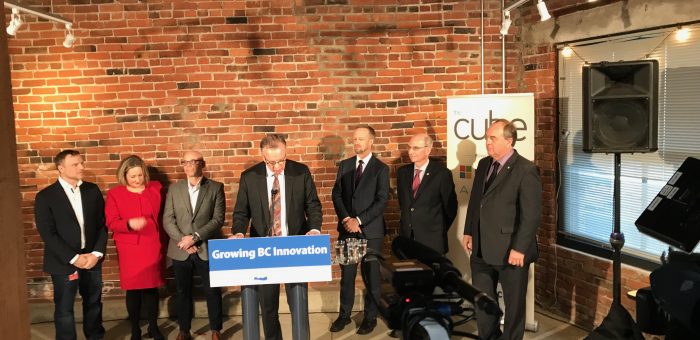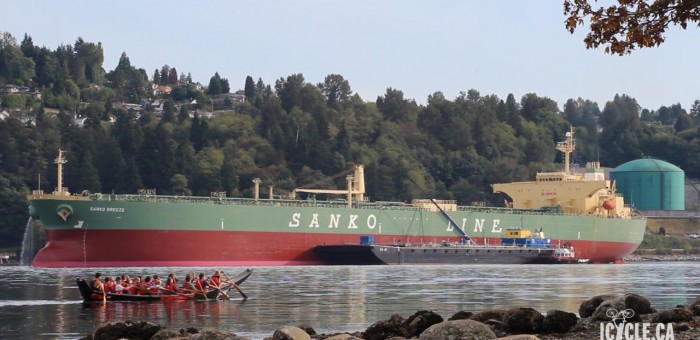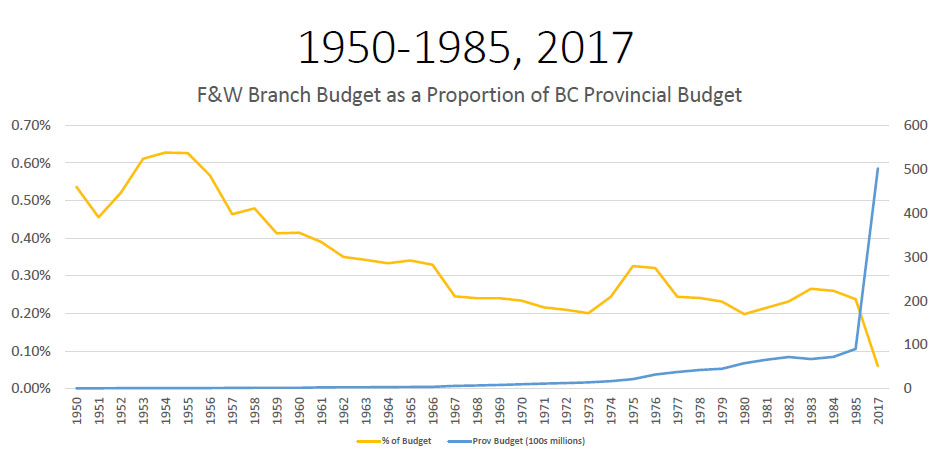Issues & Community Blog - Andrew Weaver: A Climate for Hope - Page 70
Responding to the BC Government’s announcement regarding changes to ICBC
Today the BC government announced sweeping changes to the ICBC claim process. Below I reproduce our response welcoming these changes.
Media Release
Weaver responds to ICBC changes
For immediate release
February 6, 2018
VICTORIA, B.C. – Andrew Weaver, leader of the B.C. Green Party, issued the following statement in response to the government’s changes to ICBC.
“I am encouraged that the government is putting British Columbians’ health outcomes at the centre of these policy changes,” said Weaver.
“These changes mean that a larger share of our public insurance funds will go directly towards helping British Columbians who suffer accidents recover from their injuries.
“A successful, affordable public insurance system requires government to act in the best interests of the people who participate in it. The B.C. Liberals betrayed the trust of British Columbians when they pillaged ICBC’s capital reserves, and ignored and concealed the evidence-based recommendations put forth by their own consultants. The mess left behind by the Liberals’ reckless fiscal mismanagement necessitates major changes, and I’m glad that the current government is taking this seriously.
“I look forward to seeing the proposed changes to the rate structures, but am encouraged that the Attorney General has signaled a move towards a fairer model that rewards good drivers while ensuring bad drivers pay their fair share based on risk.”
-30-
Media contact
Jillian Oliver, Press Secretary
+1 778-650-0597 | jillian.oliver@leg.bc.ca
British Columbia announces Dr. Alan Winter as Innovation Commissioner
Today in Vancouver the BC Government announced the appointment of Dr. Alan Winter as the new Innovation Commissioner. The creation of an Innovation Commission as well as an Emerging Economy Task Force were key aspects of the strategy for the new economy component of our BC Green Party Platform in the 2017 Provincial Election. We were delighted that the BC NDP shared our vision and agreed to including both as key elements of our Confidence and Supply Agreement.
The BC NDP were very gracious in inviting us to be part of the announcement. Below I reproduce my brief remarks at the event as well Dr. Winter’s biography and the BC Government’s media release.
Video of my Brief Remarks
Biography — Alan Winter
Alan Winter has a breadth of experience at senior levels in the technology sector and in government, including such roles as the president and CEO of Genome B.C. from 2001 to 2016. He was the founding president and CEO of the New Media Innovation Centre in Vancouver, the president of the ComDev Space Group in Ontario and the president and CEO of MPR Teltech Ltd. in Vancouver (at that time the largest technology company in B.C.) During his tenure as CEO, six companies were spun out of MPR, including PMC-Sierra and Sierra Wireless.
Prior to MPR, Winter worked for Telesat Canada and the federal Communications Research Centre in Ottawa, where he was responsible for the satellite-aided search and rescue project (Sarsat). The international Cospas-Sarsat system continues to be instrumental in saving many lives.
Winter is a director of the Victoria Hospitals Foundation, Ontario Genomics and Geoscience BC, an adjunct professor at the University of Victoria’s Peter B. Gustavson school of business and a member of the University of British Columbia’s Research and Innovation Council.
In 2007, he received a Leadership Award from LifeSciences BC, and in 2017 he received its Don Rix Award for Lifetime Achievement. He has served as a director of more than 30 organizations, including the Business Council of British Columbia and Alberta Innovates.
On the federal side, he was chair of the board of the Communications Research Centre Canada, deputy chair of the Council of Science and Technology Advisors, and a member of the Expert Panel on Science Performance and Research Funding, Council of Canadian Academies.
Winter is a fellow of the Canadian Academy of Engineering and a fellow of the American Association for the Advancement of Science. He is also a fellow of the Canadian Astronautics and Space Institute and received its inaugural Alouette team Award. He received his PhD from Queen’s University in Kingston, Ont. and was recognized by the Queen’s alumni Legacy of Achievement.
BC Government Media Release
For Immediate Release
2018JTT0004-000146
Feb. 5, 2018
Office of the Premier
Ministry of Jobs, Trade and Technology
NEWS RELEASE
First innovation commissioner to champion B.C.’s tech sector
VANCOUVER – British Columbia’s thriving tech sector will have a new voice in Ottawa and abroad, following Alan Winter’s appointment as the province’s first innovation commissioner.
“We’re thrilled to have Alan Winter take on this newly created role of innovation commissioner, and we look forward to creating new opportunities for B.C. tech companies, shepherding innovation across all industries and all regions of the province, and generating good jobs for people in B.C.,” said Premier John Horgan. “Today’s announcement is an example of what can be achieved through co-operation and putting the people of B.C. first. I know that Mr. Winter will proceed in that spirit of co-operation to strengthen national and cross-border relationships, and ensure that B.C. maximizes federal funding to benefit B.C. innovators and employers.”
The innovation commissioner is a component of the Confidence and Supply Agreement with the B.C. Green Party caucus to help B.C.’s tech sector access the capital, as well as the national and international connections it needs to succeed. Recognizing its potential for success, the B.C. government has adopted the concept as part of its efforts to establish B.C. as a preferred location for new and emerging technologies.
“We proposed the innovation commissioner to be an advocate and ambassador on behalf of the B.C. technology sector in Ottawa and abroad, to enable B.C. companies to more easily tap into existing federal programs and build key strategic relationships,” said B.C. Green Party Leader Andrew Weaver. “Alan Winter’s distinguished career as a leader in innovation makes him precisely the right person to champion our tech sector and help B.C. to capitalize on our strengths to build a thriving 21st-century economy.”
As B.C.’s foremost tech advocate, Winter’s mandate will include relationship-building with senior government leaders in Ottawa and with B.C.’s tech and innovation network, including partners in industry, academia and the province’s regional tech accelerators.
“Alan Winter’s breadth of senior leadership experience in the biotech and information technology fields makes him the ideal ambassador for our tech and innovation sector,” said Minister of Jobs, Trade and Technology Bruce Ralston. “His appointment is one of the many ways your government is working to enhance B.C.’s economy and continue to grow our thriving innovation sector.”
The innovation commissioner will help leverage federal funding programs in support of B.C.’s tech and innovation sector. He will also take an active role in B.C.’s partnership with Washington state to further develop the Cascadia Innovation Corridor.
“I want to make sure B.C. companies are at the front of the line for investment and partnership opportunities, both here in Canada and around the world,” Winter said. “My first priority will be championing Canada’s Digital Technology Supercluster, which could provide B.C.’s tech sector with a major boost in federal funding.”
The innovation commissioner has been appointed by order-in-council for a term of one year, with the option for reappointment based on performance.
Seeking bold action: BC Green caucus release housing priorities for Budget 2018
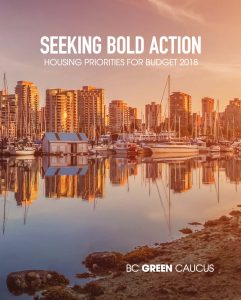 Over the last few months my caucus colleagues, legislative staff and I undertook extensive research and consultation as we developed our housing policy priorities for input into the Budget 2018 consultation process. Today we released the results of our analysis during a press conference at the Creekside Community Centre in Vancouver. Entitled Seeking Bold Action: Housing Priorities for Budget 2018, our policies place an emphasis on curbing speculation and the role of global capital in our housing market.
Over the last few months my caucus colleagues, legislative staff and I undertook extensive research and consultation as we developed our housing policy priorities for input into the Budget 2018 consultation process. Today we released the results of our analysis during a press conference at the Creekside Community Centre in Vancouver. Entitled Seeking Bold Action: Housing Priorities for Budget 2018, our policies place an emphasis on curbing speculation and the role of global capital in our housing market.
The affordability crisis is devastating communities across our province. In particular, despite significant evidence of the role of speculation in driving up prices, successive governments have failed to act on the demand side.
In February the NDP Government will table their first full budget. They have a critical opportunity in front of them to take real action on housing affordability and protect the future for people of all ages and demographics in our cities.
Developing constructive solutions to the affordability crisis has been our top priority and we have already communicated our suggestions directly to government.
Below I reproduce my opening remarks at the press conference along with a copy of our press release.
Opening remarks
Today, I’m pleased to release a document outlining our priorities for action from this government on housing affordability.
In February the NDP Government will table their first full budget. They have a critical opportunity in front of them to take real action on housing affordability.
British Columbians have waited for action on this file from government for far too long.
People have watched as years of government inaction have allowed house prices to spiral out of control, as neighbourhoods empty and people are forced to make huge sacrifices to live in our cities.
This must not be allowed to continue. We need bold action now to tackle this crisis and make our cities vibrant, welcoming, and affordable.
Houses are not commodities – like gold or potash – which can be bought, sold, and traded exclusively for profit.
Homes are where people live, and they are the centre of our communities.
Yet our province is turning into a playground for the wealthy and our real estate a bank account for the wealthy.
Our cities have become a place for speculators to park their capital and reap huge returns, while ordinary British Columbians struggle to find a suitable place to live.
The skyrocketing price of real estate is precluding young people and families from buying homes in our cities.
Sky-high rents and near 0% vacancy levels in several communities are forcing renters to contend with huge competition, and to live in cramped and unaffordable accommodation.
As a result, young people are finding it increasingly difficult to see a future for themselves in our cities.
Small businesses in our cities are struggling to make rent, pay their property taxes and attract workers.
I’ve heard from many industries, especially our growing tech sector, that are struggling to attract and retain talent, because people can’t afford to live in our cities.
This is becoming a threat to our economy and must be fixed.
in January, an Insights West Survey found that 50% of British Columbians said that housing, homelessness and poverty was the #1 issue in BC. That’s up from 36% in August, and 14% in 2015.
Yesterday, a poll released by Angus Reid found that half of British Columbians want to see the housing market cooled. Just 14%, and just 1 in 5 existing homeowners, want to see prices continue to climb.
As part of our agreement with the NDP, we have the opportunity to share our priorities with them through budget consultations.
In this document, we summarize our input into the consultations and outline our priorities on housing affordability.
First and foremost, we want to see government take strong steps to curb speculation and restrict the impact of global capital on our housing market.
There is a great deal of evidence that foreign money is having a significant impact on our housing market, driving up prices well beyond what local incomes can afford.
Moreover, both global and domestic speculators are treating our houses as commodities to be bought, sold and traded exclusively for profit. They are reaping huge gains and pricing out people with average incomes who live and work in our cities.
But despite this, the provincial government has been hesitant to take action on global demand or on speculation. We think this needs to change with this budget.
When businesses can’t hire employees, when students are forced to shell out $800 a month to live in a tiny room, when our young people can’t see a future for themselves here, we need to realize that we are in an emergency.
Let’s take action to ensure that our houses are for homes first.
We believe that a crucial action government should take is to restrict the foreign purchasing of property in BC.
People who don’t live, work, and pay taxes here should be prohibited from purchasing existing property here. We can follow the lead of a number of other jurisdictions around the world, like New Zealand, that have done exactly this.
We also want to see government implement a speculators tax that targets absentee owners who own property in BC but do not pay adequate income taxes here. If the NDP does not pursue restrictions on foreign ownership, it is critically important that they include a speculator’s tax like this in this budget.
Government should levy a tax on flipping, to discourage the rapid flipping of property for profit, which drives up prices and adds no value to communities.
This government needs to take steps to protect the ALR from the impacts of speculation, including restricting the foreign ownership of ALR land and working with local governments to limit house sizes.
And we want to see loopholes closed that allow people to avoid paying taxes, including the bare trust loophole and ensuring that the foreign buyers tax applies to purchases of ALR land, partnerships, and pre-sales.
Our second priority is ensuring that we free up existing supply and ensure that new supply meets the needs of average British Columbians, not wealthy speculators.
A key part of achieving this goal is working with and empowering local governments to tackle the crisis, with the support of the province.
The province should work with local governments to regulate and restrict short-term rentals, to to encourage property owners to return units to the long-term rental supply.
The province should give all local governments the ability to tax empty homes, like they’ve done for the City of Vancouver, to discourage absentee ownership and raise revenues at the municipal level for housing initiatives.
And, the province should help local governments rethink zoning to increase the right kind of supply.
We also want to ensure that government deals with the impacts of the crisis on British Columbians in a responsible way, that does not put further inflationary effects on the market.
The irresponsible and risky BC HOME partnership should be repealed, and assistance to renters should be means-tested, streamlined and effective, to ensure help is going to those who need it most.
Finally, it is critical that government improve data collection and transparency, disseminate to support decision-making and to crack down on tax evasion and fraud.
To summarize
The scale of this crisis requires bold, decisive action if we are to make our cities livable and affordable.
Our cities should be places where people can afford to live where they work:
- where young people feel optimistic about their future;
- where small businesses thrive;
- And where neighbourhoods are vibrant and full of life.
This is the kind of society we should be building, and we will continue to pressure government to ensure that they deliver.
Thank you.
Media Release
Weaver releases B.C. Green Caucus housing policy priorities in Vancouver
For Immediate Release
January 31, 2018
VICTORIA, B.C. – Andrew Weaver, leader of the B.C. Green Party, released a summary of his Caucus’ housing policy priorities today in Vancouver. The Party’s Confidence and Supply Agreement with the B.C. NDP commits both parties to collaborate to make housing more affordable by increasing supply and dealing with the role of speculation and fraud. The policy document released today is a summary of the B.C. Green Caucus’ recommendations to government for the upcoming provincial budget.
“The affordability crisis is devastating communities across our province,” said Weaver. “In particular, despite significant evidence of the role of speculation in driving up prices, government has failed to act on the demand side. Our policies place an emphasis on curbing speculation and the role of global capital in our housing market.
“British Columbians have awaited action for far too long. It is time to move past rhetoric and get to work delivering solutions. We are putting forth realistic, evidence-based policies so that our consultations in this minority government are more transparent, and so that we can keep the pressure on government to take action.”
The measures the B.C. Green Caucus is urging government to implement include:
1. Curb speculation and the impact of global capital
- Restrict foreign purchasing of property
- Implement a speculators tax
- Implement a tax on flipping
- Close the bare trust loophole
- Close loopholes in the foreign buyers tax
- Implement ALR restrictions
2. Increase the supply of affordable housing
- Work with local governments to regulate and restrict short term rentals
- Give local governments the ability to tax empty homes
- Help local governments rethink zoning
3. Enhance financial stability for home-buyers and renters
- Eliminate the BC HOME partnership
- Instead of a universal “renters’ rebate”, provide means-tested support for renters
4. Improve transparency and data
- Collect more data on buyers and sellers of real estate
- Close loopholes enabling some investors to hide their identities
- Disseminate data more freely and regularly
“Everyday we are hearing stories from all corners of the province about the impact of this crisis, from young people forced to move out of province, to businesses who are struggling to pay rent and attract workers due to the cost of living,” added Adam Olsen, B.C. Green Party spokesperson for housing and municipal affairs.
“This is not healthy for our economy and it is not healthy for our communities. Our communities should be places where people from all walks of life can thrive. We will continue to push for bold action on this file so that we can ensure all of B.C.’s communities are vibrant, healthy and affordable.”
-30-
Media contact
Jillian Oliver, Press Secretary
+1 778-650-0597 | jillian.oliver@leg.bc.ca
Responding to government spill response measures
Today the BC Government announced its second phase of regulations to improve preparedness, response and recovery from potential spills. As part of this announcement, restrictions have been put in place to ensure that there will be no increased transport of diluted bitumen (dilbit) in British Columbia until the fate and behaviour of a dilbit spill is better understood scientifically and there is adequate ability to clean up such a spill.
My colleagues and I are very pleased with this announcement. Those who have been following developments on this file will know that I spent an enormous amount of time serving as an intervenor as part of the National Energy Board hearings on the Transmountain pipeline expansion. In fact, in December 2013, we called on the then BC Liberal government to impose a moratorium on dilbit transport on our coast due to the inadequacy of British Coumbia’s spill response and uncertainty in the scientific understanding of fate and behaviour of a dilbit spill. This was further emphasized in my final argument, oral testimony and open letter to Prime Minister Trudeau.
Below I reproduce the press release that we issued in support of the government’s announcement.
Media Release
Weaver responds to government spill response measures
For immediate release
January 30, 2018
VICTORIA, B.C. – Andrew Weaver, leader of the B.C. Green Party, responded today to Minister George Heyman’s announcement that the government is proposing additional measures to protect our environment and coastal waters from heavy oil spills.
“I am pleased to see Minister Heyman putting evidence and science front and centre in government decision-making where it belongs,” said Weaver.
“In particular, I welcome the independent scientific advisory panel that will be established to assess whether regulations can mitigate the impact of heavy oil spills in our precious coastal waters. Our coastal waters provide significant economic activity for our province and the entire country, be it from tourism, fishing or real estate, and are of great cultural significance to First Nations. It is essential that they be adequately protected.
“For several years my office participated extensively in the NEB hearing process for the TransMountain pipeline. We presented evidence from two independent expert assessments that validated our evidence by making it abundantly clear that we simply to not know enough to properly assess the risk and potential damages associated with a diluted bitumen spill in the Salish Sea.
“I look forward to the new panel providing complete, robust and accurate information on this matter to the Minister that reinforces what which we already know – that there is no way currently to adequately respond to a spill of diluted bitumen.
“Furthermore, I am pleased that the government will examine important issues like response times, geographically-specific response needs for our diverse province and compensation for loss of public and cultural use of land, resources or public amenities. B.C. has a rich history of sustainable natural resource development, but it must be done in a way that benefits British Columbians. We must ensure that we are not putting our economy and our communities at risk.”
Weaver was the only MLA to intervene as an individual in the National Energy Board hearings on the TransMountain pipeline expansion. His office was an active participant in the NEB hearing process and submitted a comprehensive report outlining major issues with the spill response regime. Adam Olsen, now Green Party MLA for Saanich North and the Islands, also intervened as a member of the Tsartlip First Nation.
-30-
Background:
The reports referenced above are:
- The Royal Society of Canada Expert Panel Report entitled: The Behaviour and Environmental Impact of Crude Oil Released in Aqueous Environments;
- The US National Academy of Science’s report entitled: Spills of Diluted Bitumen from Pipelines: A Comparative Study of Environmental Fate, Effects, and Response.
Media contact
Jillian Oliver, Press Secretary
+1 778-650-0597 | jillian.oliver@leg.bc.ca
Before it’s too late: British Columbia needs a science- and ecosystem-based approach to wildlife management
At the time of European contact, wildlife were so abundant in British Columbia that early explorers marveled at the richness of the land.
“The country is so crowded with animals as to have the appearance in some places, of a stall yard,” Alexander Mackenzie wrote in his journal in 1793 while on the Peace River. He reported seeing herds of elk on the grasslands near Bear Flat, the irreplaceable habitat that will be drowned when the Site C dam is constructed.
Just over a decade earlier, on the West Coast of Vancouver Island, Captain James Cook noted an abundance of sea otters. He traded pelts into China, sparking a rush for furs that didn’t abate until sea otter populations crashed. It was the first example, in what would become known as British Columbia, of economic forces eradicating a species.
Early European settlers established markets not only for furs, but also for the hides and meat of wildlife. The uncontrolled harvesting that followed soon led to the extirpation of Roosevelt Elk on the Lower Mainland and Wood Bison in northern B.C.
By the late 1800’s wildlife losses were so widespread the public began demanding an end to the free-for-all. In 1859 the first ordinances “providing for the protection of game” were passed in B.C. In 1905 the government organized wildlife management, establishing the Department for the Protection of Game and Forests, although it didn’t get funding until 1908. The annual budget: $10,000.
In 1933 Aldo Leopold, an American conservationist and writer, published Game Management, a book that has been credited with creating the discipline of wildlife management through the application of scientific principles. Indeed, his work planted the seeds of what would eventually become the North American Model of Wildlife Conservation.
One of the key tenets of the Model, which is now widely applied across the continent, is that science – not the dictates of special interest groups – should guide wildlife policy.
I have dedicated my life to understanding our world and its problems through science, but have been surprised at how difficult it is to convince governments to consistently follow scientific reasoning. While the concept of science-based wildlife management has generally been endorsed in B.C. it has not always been applied.
There have been successes. Sea Otters are making a comeback, elk herds are increasing in southern B.C. and bison were successfully reintroduced to some areas in the north. But its selective use has lead to more disasters.
Many wildlife populations are in jeopardy today. Mountain caribou are facing extirpation, wild salmon – a foundation species – are in shocking decline, spotted owls are virtually extinct, and moose populations, which many rural families rely on for sustenance, are in trouble across the province.
What we find in almost all of these instances is that there has been inadequate science, particularly concerning cumulative impacts, and that an unacceptable loss of vital habitat has occurred. The management of wildlife, and the application, or not, of scientific principles, continues to stir great controversy and emotional debate in B.C. Understandably so.
Wildlife management conflicts in which species are pitted against one another are truly challenging, but I have always maintained that humans – elected representatives in particular – have a moral obligation to prevent endangered species from going extinct.
Often, extreme situations are created because government has failed to act. They are typically situations that – for a variety of industrial, social, or budgeting excuses – have been allowed to escalate far past a point of simpler intervention.
When you start rationalizing culling one species to protect another you also introduce an ethical element that needs to be considered alongside scientific findings. Let one – or both – of those species become threatened or endangered, however, and your situation becomes immensely worse.
Some say that humans should not interfere with nature, but sadly, intervention is sometimes necessary. Simply put, many ecosystems have been altered so drastically that we can no longer just stand by and let nature take its course.
If we don’t continue to intervene with the mountain caribou crisis we are currently facing, for example, it will not be long before the remaining herds in the South Selkirk and Peace regions are extirpated.
We cannot let that happen.
Predator control, hunting closures, and restrictions that stop industries from undertaking resource developments are all difficult matters for governments to deal with.
But things aren’t going to get easier. The management of wildlife is becoming increasingly complex and fraught with risk.
Habitat loss is mounting.
The human population is growing.
Roads and pipelines have been spreading into the farthest reaches of the province, and researchers have discovered how such developments increase predation, shift wildlife distribution, and impact abundance.
Wolves, for example, use road and pipeline clearings to get a good line of sight on caribou, expanding into new territory to more efficiently track down their prey. Increased road densities and human activity in wilderness areas elevates human-caused mortality of grizzly bears and reduced the number of bears in the area, scientists at the University of Alberta have recently found.
In a paper published this week in the journal Conservation Biology, scientists wrote about threats to biodiversity from cumulative human impacts in B.C., “one of North America’s last wildlife frontiers.”
“Land-use change is the largest proximate threat to biodiversity yet remains one of the most complex to manage,” they wrote. “For ecosystems, we found that bunchgrass, coastal Douglas fir, and ponderosa pine have been subjected to over 50% land-use conversion, and over 85% of their spatial extent has undergone either direct or estimated indirect impacts.”
Adding to all these other stressors now is climate change. The full implications aren’t yet clear, but we cannot situate our wildlife strategies in the past. Our environment is changing and will continue to do so.
We must be prudent and precautionary as we manage our changing landscape as the planet warms. The timing and abundance of food availability, for instance, will shift for some plants and animals. Species reliant on their stability will need space and additional resources if they are to adapt.
Another challenge that will become increasingly present in B.C. is that of invasive species. Not species introduced from a faraway land, though that will continue to be an issue, but species that have migrated from nearby landscapes as their own native environment ceases to meet their needs — climate refugees, in a sense.
As certain areas become warmer, for example, native species may start to move north. How will we manage those newcomers if they are having a negative impact on our own resident species? What if the invasive species are threatened or endangered in their home ecosystem?
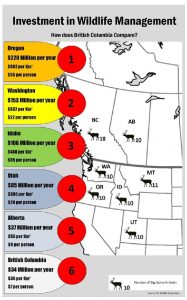 A few years ago, with concerns growing about how B.C. was managing wildlife in the face of growing pressures, the B.C. government assigned an MLA to do a comprehensive review of its policies.
A few years ago, with concerns growing about how B.C. was managing wildlife in the face of growing pressures, the B.C. government assigned an MLA to do a comprehensive review of its policies.
“There has never been a time in British Columbia’s history where balancing the cumulative impact of resource development and biodiversity has been so complex.” Liberal MLA Mike Morris wrote in his 2015 report, Getting the Balance Right: Improving Wildlife Habitat Management in British Columbia.
“There is an urgency and heightened concern amongst resident hunters, guide outfitters, trappers, the wildlife viewing industry and conservationists that the province is not acting quickly enough to address the decrease in wildlife populations and the degradation of wildlife habitat,” Morris wrote.
He called for more wildlife management staff and “better planning, better science and more timely and effective implementation of policies and programs.”
But the government never delivered.
“B.C. balks at changing law to protect wildlife and biodiversity” said The Vancouver Sun headline.
“The B.C. government will not be changing laws or considering hiring more staff as recommended in a report by one of its own MLAs on how to protect wildlife and biodiversity from the effects of resource industries,” the story said.
For far too long government has shortchanged wildlife management in B.C.
It’s fine for Ministers to say they support science-based decisions – but where is the science? Where are the field researchers? Where are the basic boots on the ground that are needed to keep a close watch on our wildlife populations and habitat?
The necessary funding just isn’t there.
B.C. ranks behind its neighbours in the northwest when it comes to investment in wildlife management. Alberta, Washington, Montana, Oregon, Idaho, Utah – all spend more on managing less.
The shameful underfunding of wildlife management has taken place under successive Liberal regimes. Now we have a new NDP government, but it has yet to show if it will fully embrace – and fund – science-based management.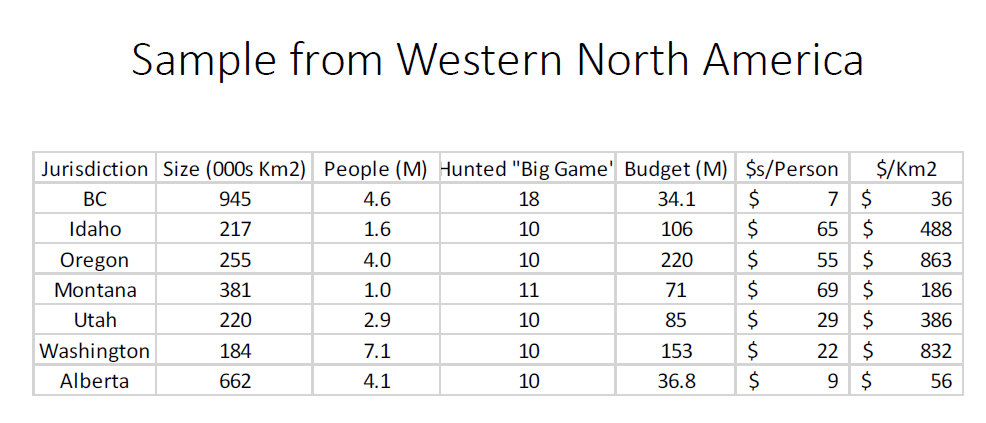
The problem is compounded because Ottawa too has been cutting back on wildlife science. In B.C. our wild salmon stocks are in decline, putting in jeopardy not only the economies of fishing communities, but also the health of killer whales, bears, eagles and other predators.
But a study published recently concluded, “there is inadequate information to determine the biological status of roughly one-half of all CUs ” in B.C.
CUs, or Conservation Units, are the system by which the federal government is supposed to monitor and manage our wild salmon stocks.
But Canada’s Wild Salmon Policy: an assessment of conservation progress in British Columbia reports that the government just basically gave up on collecting the data. We don’t know what is happening on the rivers because the government stopped keeping track.
“Our state of knowledge regarding salmon populations is eroding rapidly. Without increased support for escapement surveys and the transfer of knowledge to the next generation, the rich legacy of population data available for BC’s north and central coasts is at serious risk of becoming irrelevant for future assessments of management and conservation status,” states the study led by Simon Fraser University researchers Michael Price and John Reynolds.
B.C. is Canada’s most ecologically diverse province but if we are to maintain that rich biodiversity, we need to see a serious commitment to science-based, evidence-based wildlife management – and we need to have dedicated wildlife funding put in place, so managers have the budgets, and the staff, required to do the job.
As the Select Standing Committee on Finance and Government Services recommended in its Report on the Budget 2017 Consultations, license fees collected from natural resource users (hunters, anglers, ecotourists, etc.) should be directed into conservation and wildlife management services, rehabilitation, enforcement and education. In that, we must “prioritize and fund restoration and protection of endangered fresh and saltwater fish species and fisheries.”
Effective natural resource management is reliant on funding, science, and social support. We seem to have consensus on this within the B.C. government, but it needs to be put into action.
Prior to the election, I campaigned on establishing a Natural Resource Commissioner who could lead a Natural Resources Board responsible for establishing sustainable harvest and extraction levels and reporting on the state of B.C.’s environment and natural assets. The NRB, I proposed, would conduct cumulative impact assessments, and oversee the professional reliance model.
Since the election, the government has been working with us to improve the professional reliance model and B.C.’s environmental assessment process. We haven’t talked about creating a Natural Resource Commissioner position, but there is much we should to advance its values of scientific monitoring, reporting, and cumulative assessment.
Managing wildlife has always been difficult, but never more so than now, in the face of climate change. According to data released by scientists at NASA, 2017 was the second warmest year since record-keeping began in 1880, second only to 2016.
In the face of great challenges, it is clear to me that we need a comprehensive science- and ecosystem-based approach to wildlife management. We simply cannot continue to perpetuate the slow, methodical extirpation of native species in B.C.
Ecosystem-based management calls for natural resources, habitat, and species to be managed collectively, over a long time frame, rather than just looking at a single sector or single species.
Cumulative impacts are assessed – an approach which B.C. urgently must follow because of the sweep of industrial development now taking place in many sectors of the province.
Given the myriad challenges facing wildlife in our province, two of the best things we can do to protect biodiversity is to leave key habitat areas intact and fund environmental science. As the global climate warms and precipitation patterns shift, having a complete ecosystem within which animals and plants can try to adapt will be essential, and frankly it is the least we can do given the dire situation many species are in. Having an informed understanding of the changes taking place will help too.
It won’t be easy. But proactively protecting ecosystems – so we can all be resilient to the changes a warming climate will bring – is vital.

